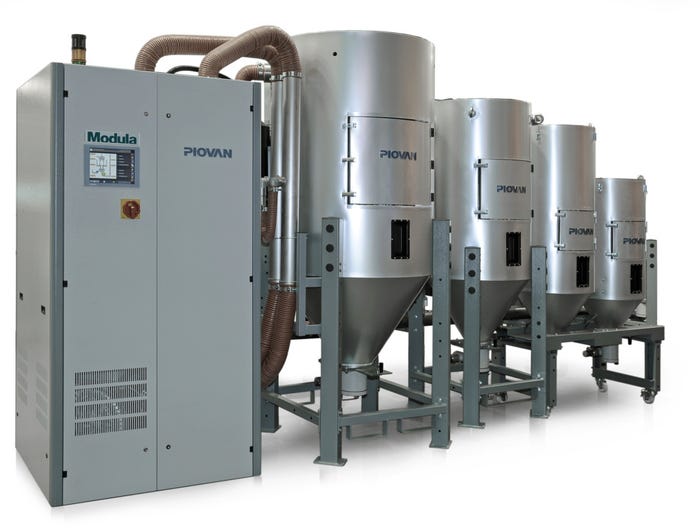Piovan's material handling and drying equipment is playing a central role in BMW's new i3 and i8 production facilities after beating out five competitors on the basis of energy efficiency, ease of use, and productivity. Two sets of Piovan Modula drying technology were supplied to BMW, with each consisting of a single dry-air generator and seven drying hoppers with volumes ranging from 600 to 1000 liters.
July 16, 2013
Piovan's material handling and drying equipment is playing a central role in BMW's new i3 and i8 production facilities after beating out five competitors on the basis of energy efficiency, ease of use, and productivity. Two sets of Piovan Modula drying technology were supplied to BMW, with each consisting of a single dry-air generator and seven drying hoppers with volumes ranging from 600 to 1000 liters. BMW also purchased Piovan's Varyo vacuum conveying systems, MDW gravimetric blenders, and Winfactory control system.
Installed at one of the new German production sites for the i3 and i8 vehicle lines, the two Modula systems will eventually support 12 injection molding production lines, with six lines installed in a first phase of production.
Piovan Modula drying system
BMW will mainly be drying blends, according to Piovan, including ones with a polypropylene or polycarbonate base, like PP/EPDM and PC/SAN. Parts are molded and immediately transferred to painting lines. A Piovan release noted that this represents a very sensitive production stage in which silicone particles are not allowed. The fact that Modula system has no silicone components or parts that could contaminate that painting step was reportedly a key factor in the German auto maker choosing the Italian technology.
The Modula system supplied to BMW automatically adjusts and controls all operating parameters for each individual hopper so that only the required amount of energy is used.
Piovan said its patented airflow measuring device, which is located in the air supply line and at each hopper, allows airflow to be adjusted and controlled automatically and individually, hopper by hopper. In the system, a control software manages the settings for each hopper on the basis of data collected by sensors installed within the line.
Launched at K 2010, Modula is now available for medium and large capacity applications, ranging in throughput from 200 to 2000 kg/hr. The company advertises offering energy savings of as much as 50% compared to standard centralized drying systems of equivalent capacity.
When it debuted three years ago, the system, which can independently manage up to 12 hoppers, was only available for medium capacity applications in the 200 to 300 kg/hr range.
BMW's i3 line of fully electric vehicles began mass production in 2013 with initial deliveries slated for this November. The line is billed as the first mass market vehicle to apply carbon fiber reinforced plastics (CFRP) on a large scale, with CFRP bodies in white produced from a new plant in Moses Lake, WA. Production then shifts to Germany at facilities in Wackersdorf and Landshut, with final assembly in Leipzig. BMW's Landshut plant, which opened in 1967, employs 3000 and produces light metal casting and plastic components for interior and exterior applications.
About the Author(s)
You May Also Like


